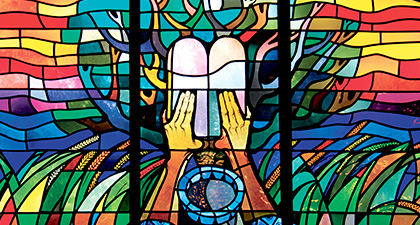Three Canadian Reconstructionist leaders consider whether their denomination should ordain rabbinical students married to non-Jews.
In 1989, when I began attending the Reconstructionist Rabbinical College (RRC), there was no guarantee that I would ever find congregational work or rabbinic employment of any kind in the mainstream Jewish community. Why? Because of the person I loved.
See also:
Intermarried rabbis aren't the answer
Rabbis should be role models
There are many who will argue – correctly – that the analogy between the issue of rabbis partnering with members of other religious backgrounds and the changes that have unfolded in synagogue life regarding sexual orientation and sexual expression among clergy is an imperfect one. Yet a heightened sensitivity around both issues is unfolding amid tremendous changes in the North American Jewish communal landscape.
No one can dispute that we are in the midst of a huge paradigm shift. Many reports – articulate, persuasive, fluent with the research – have crossed our screens and news feeds since that big calendar change 15 years ago. Buzz words – remember continuity? – have come and gone. Yet pervasive hand-wringing persists. Will our people survive? Will we make and bring up enough Jewish babies who will then make and bring up Jewish babies? This, I believe, is at the core of the deep fear that pervades Jewish life in the 21st century.
Contrary to recent headlines, the RRC does not have a “ban” on “interfaith” or intermarried rabbis or rabbinical students. A January 2015 article in the New Republic was headed by the puzzling “Is American Judaism Ready for Interfaith Rabbis?” and a recent JTA report, titled “Reconstructionists Consider Dropping Ban on Intermarried Rabbis,” was widely picked up by the Anglo-Jewish press.
The current policy reads: “The RRC does not ordinarily admit or graduate as a rabbi a student married to, or in a committed relationship with, a non-Jew.” While not necessarily relevant to the vast majority of applicants, this sentence has sparked fierce and sometimes painful conversations in the college community. Many lives were adversely affected. The college faculty discerned a need to revisit the policy, did so, and is still in the midst of its discernment, while having passed a preliminary vote in favour of altering the policy. (Those alarmed by the headlines may rest assured that even if the change passes a final vote, no “interfaith rabbis” will be ordained by the RRC!)
Like all of the decisions Reconstructionist leaders strive to reach, the college employed a values-based decision-making process. I was trained, and indeed was compelled only by this rabbinical training seminary, to bring Judaism’s treasure trove of textual wisdom to lived lives of Jewish people while integrating contemporary mores.
Peoples change, and leaders lead. Inclusivity and diversity, newer buzzwords, are not proffered as replacements for standards or boundaries. Rather, what is happening in Jewish homes and hearts reflects the ever-evolving life-scape of our people. Of the dozen or so couples with whom I have met in Ottawa over the past year and a half, one looked like a “traditional” pair – young, endogamous, opposite sex – and in that couple, one partner converted! To them, and to all of my couples, I convey my firm belief that they are the face of the Jewish community, that they are inside – not outside needing to be included, not different because their race or ethnicity is marked as non-normative by unspoken assumption – our community, and I celebrate their presence.
Others may address the questions of whether or not rabbis should be held to a different standard; whether inter-partnering is detrimental to the Jewish People, and therefore should de facto be outside the range of permissibility for a rabbi; and whether this will further “mark” our movement as extreme, and hamper the credibility of our rabbis, cantors, congregations or initiatives. My colleague, Rabbi Julie Greenberg, writing about the sacredness of family with a “parenting partner” who was not her spouse, wisely once said: “All partnered people engage in a cross-cultural endeavour.”
When we conclude the annual cycle of Torah reading we read this phrase, which is also quoted in the well-known liturgical prayer, Yigdal: “Lo kam beyisrael keMoshe od.” In Israel, none arose as prophet like Moses. I thought of this phrase when I came across this response in the comment thread to the New Republic article: “The reality is that ‘intermarriage’ is simply an opportunity to expand… to a new person through marriage… Moses married a non-Jew and brought her into the fold.”
Rabbi Joy Levitt and Steve M. Cohen put these cards on the table in a perceptive and timely JTA article last month: “Jews today are facing an unprecedented opportunity to share our rich tradition with thousands who are searching for meaning and looking to raise healthy and happy children with a deep connection to community.”
I share their optimism and add my hopefulness for the possibility of welcoming all of my passionate, Jewishly committed, creative colleagues who will graduate from the Reconstructionist Rabbinical College of the future.
Rabbi Elizabeth Bolton is the first resident rabbi of Or Haneshamah, Ottawa’s Reconstructionist Community.
